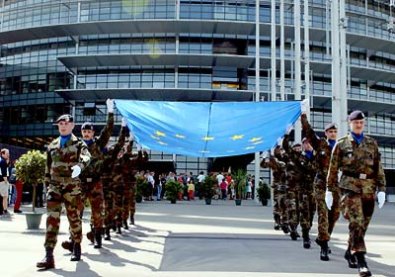
From Lawrence Norman and Stephen Fidler, the Wall Street Journal: On Wednesday evening, Mr. Sarkozy told assembled diplomats in Paris that NATO "has shown itself to be an indispensable tool in the service of our military operations." The success of military operations over Libya was possible because France had reassumed its position in NATO’s military command, he said.
A further reason is the view that NATO’s campaign, close to Europe’s shores and small even compared with past NATO air campaigns in the Balkans, couldn’t have been achieved without considerable U.S. help—as NATO Secretary-General Anders Fogh Rasmussen said in an interview last month with The Wall Street Journal. From a practical standpoint, a sophisticated European military operation still needs Washington.
"The Libya mission, much heralded as the blueprint for a more independent European defense posture, would have fallen apart without American logistics, reconnaissance, command and control and ammunition," said Jan Techau, director of Brussels-based think tank Carnegie Europe and a former German defense ministry official.
Only a minority of European countries wanted to get involved in Libya—even though it was a relatively uncontroversial mission with a United Nations mandate in Europe’s "backyard." This exposed the deeply divergent views within Europe about the utility of military force, with Germany the most powerful skeptic. That makes a common defense policy very difficult to realize. . . .
Further undermining pretensions to a separate European policy are the budget cuts that most European nations are now embarking on. In a recent paper, Mr. Techau argues that the aspiration of a common European security capability doesn’t pass even the most basic reality test. He says most member states don’t seriously want to pursue it, and even those inclined toward it aren’t prepared to pay the price for it. . . .
David Livingstone at Chatham House, the U.K. foreign-policy think tank, says that given the U.S. faces its own budget cuts and is likely to turn more to security alliances and threats in the Pacific, it would be folly to assume it will be ready to step in for Europe 10 or 20 years from now.
He argues that the EU can learn what NATO has had 60 years of experience to develop: carefully crafted political deals that knit together the capability for joint action from a variety of national resources. "Everyone understands NATO is a unified political structure, it’s got a very refined negotiating process among its members which the European Union does not have. But I think it’s only a matter of time," he said.
Some analysts wonder whether France’s newfound enthusiasm for NATO will survive Mr. Sarkozy, who faces a re-election campaign next year. But even enthusiasts for a common EU defense policy worry about how rapidly their vision is fading. "Paris is about to succeed in the amazing challenge of reducing the interest and ambitions of the [EU’s common defense policy] at a pace and with an efficiency that even the most Euroskeptic British would not have dreamed of," lamented Bastien Nivet of the Paris-based Institute of International and Strategic Relations in an editorial last week in Le Monde. (photo: Cafe Babel)
Image: cafe%20babel%207%2011%2011%20EU%20defense.jpg
